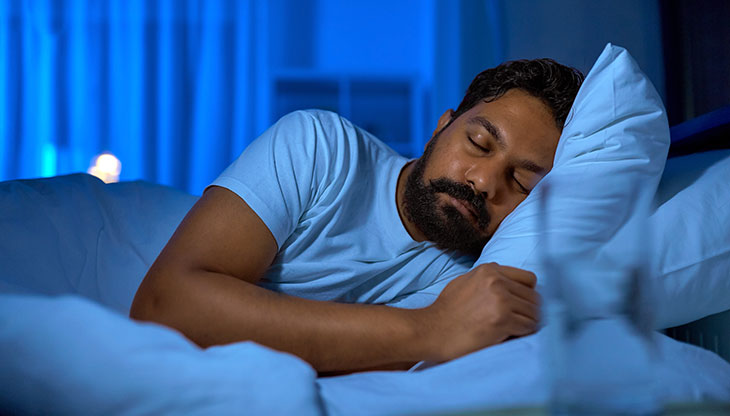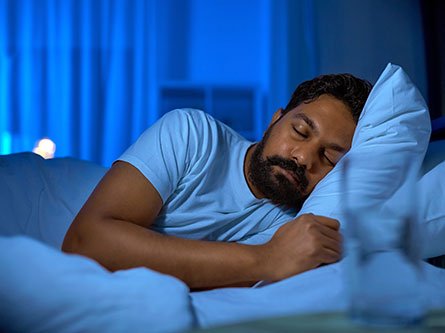
Have you ever wondered if melatonin could help you get a good night's sleep? If so, you're not alone. This supplement is the fourth most popular natural product taken by adults and second most popular natural product parents give to their kids. And more and more people are trying it.
A 2017-2018 survey found 2.1% of American adults take melatonin, up from 0.4% in 1999-2000, the National Institutes of Health reported. SleepFoundation.org conducted a survey in September 2022 that found that more than 27% of U.S. adults reported taking melatonin to help them sleep.
This popular supplement can help people fall asleep, but it should be used only after trying to implement a good sleep routine.
What is melatonin?
Melatonin is a hormone produced naturally by a gland in your brain. This hormone helps regulate your body's circadian rhythm or sleep cycle.
Our brains make melatonin on our own. Our bodies normally start to release melatonin about one to three hours before bedtime.
Melatonin supplements give your body extra melatonin that can help some people fall asleep. Most melatonin supplements are synthetically derived, meaning they're made in a lab.
What does melatonin do to your body?
Melatonin supplements give your body more of the hormone that helps regulate your sleep. For some people, melatonin supplements have a hypnotic effect and help get them to sleep. It can increase your quality of sleep, how quickly you fall asleep and how long you sleep.
It can help people who have insomnia (trouble falling asleep or staying asleep) and other sleep-related conditions.
Sign up for our Health Highlights e-newsletter
Is it OK to take melatonin every night?
Melatonin supplements should never take the place of good sleep practices. Most physicians recommend committing to these practices before turning to melatonin.
Good sleep practices include:
- Having a consistent bedtime and wakeup time.
- Limiting screen time two hours before bedtime.
- Avoiding caffeine and alcohol later in the day.
- Sleeping in a dark room and keeping temperatures on the cooler side – ideally low to mid-60s.
Short-term use of melatonin supplements appears to be safe for most people. This means one to two months. After that, you should stop using it and see how you're sleeping. However, long-term use of taking melatonin has not been studied much, according to the U.S. Department of Health and Human Services.
Get some tips for better sleep and why it's important for your health
Learn how blue light affects your eyes, sleep and health
What are the side effects of taking melatonin?
The most common side effects of melatonin supplements are drowsiness and headaches. Many people experience vivid dreams and nightmares while taking melatonin.
At higher doses, some people have other side effects including:
- Feeling confused and disoriented
- Nausea
- Vomiting
- Waking up in the night
- Dizziness
- Irritability
- Bedwetting
Overall, at low doses, when given appropriately for the shortest amount of time, melatonin is typically safe and well tolerated.
Learn about our Sleep Medicine Clinic
Does melatonin require a prescription?
No. Melatonin is sold over the counter as a dietary supplement. These products are not approved by the U.S. Food and Drug Administration.
As a result, these products may include things that are not safe because they're not well regulated. Melatonin products have been found to have CBD or other supplements in them. Additionally, because of the lack of regulation, it's difficult to know if the dose advertised is actually what you're getting.
One study published by the American Medical Association in April 2023 looked at over-the-counter melatonin gummies. In these products, the actual quantity of melatonin ranged from 74-347% of the labeled quantity. Researchers found that 22 of the 25 products – 88% – were inaccurately labeled.
It makes it nearly impossible to know exactly what dosage you're taking or giving your children. Child-resistant packaging is also not required because of the lack of federal regulations. This can lead to overdoses.
What dosage of melatonin is recommended?
Adults and children should start with a smaller dose. Gradually increase the dosage if you're not seeing benefits.
It's recommended to start children at .25 milligrams (mg) or .5 mg and then increase by .5 mg in a week if they're seeing no effects. Children under 2 years old should not be given melatonin. Adults can start with 1 mg and then increase by 1 mg each week if you're still having trouble falling asleep.
For children weighing less than 88 pounds, providers recommend 3 mg max per dose. Children and teens weighing more than 88 pounds can take up to 5 mg at once. Adults should not take more than 10 mg at a time.
Small doses can be effective. It's not the case that the more melatonin you take, the more effective it will be, or the sleepier you will be. Too high of a dose can be dangerous and associated with increased side effects.
How long before bed should you take melatonin?
Evidence shows that depending on the purpose, you want to take melatonin at slightly different times each night. If you're looking for the hypnotic or sedating effect (such as a long flight), you can take it 30-45 mins. before the desired sleep time.
To help with getting to sleep at night, take melatonin three to four hours before the desired sleep time. For example, if you want to be asleep at 11 p.m., take melatonin between 7-8 p.m. This can be adjusted earlier if your goal is to start falling asleep by 10 p.m., for example.
Is it safe for kids to take melatonin?
Melatonin supplements can be helpful for some children who have sleep issues. It's important to develop a good sleep routine with your child before turning to melatonin. If you've worked with your child on a routine for a few months and they still have trouble getting to sleep, talk to your child's health care provider.
Some children may have more challenges with sleep. This can include neurodiverse children (i.e. those with ADHD or autism), children who are blind, and teens who have delayed sleep phase syndrome. Delayed sleep phase syndrome is fairly common in teens. It means their natural sleep period is shifted much later, causing them to be unable to fall asleep before 1 a.m. or 2 a.m.
For teens with delayed sleep phase syndrome, studies have shown clear benefits of taking melatonin. Parents should give a low dose three to four hours before their teen goes to bed. For example, if your teen goes to bed at 2 a.m., start giving it at 11 p.m. It's not the desired bedtime, but it's where they are. Gradually adjust this as the sleep cycle is moved earlier.
It's important to talk to your child's pediatrician before starting them on a melatonin supplement. Parents should always be in charge of giving the supplement, even for teens. The number of overdose calls to poison control increased 530% between 2012-2021. This is partly because many supplements are in gummy form and look appealing to children.
Listen to our Kids Considered podcast on melatonin and children
Check out our Kids Considered podcast on teen sleep
What is the minimum age for melatonin for kids?
Health care providers discourage melatonin use for children younger than 2. There is not a lot of data on melatonin use this age group. Instead, it's important to establish a consistent sleep routine for young children. Parents should talk to their child's pediatrician about giving melatonin to children of any age over 2 years old.
Explore our Pediatric Pulmonology and Sleep Medicine services
This blog was medically reviewed by Dean Blumberg, chief of pediatric infectious diseases.




